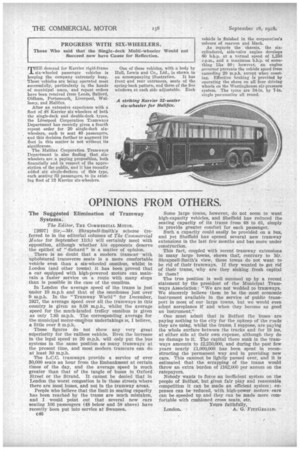OPINIONS FROM OTHERS.
Page 30

If you've noticed an error in this article please click here to report it so we can fix it.
The Suggested Elimination of Tramway Systems.
The Editor, TEE COMMERCIAL MOTOR.
[2697) Sir,—Mr. Shrapnell-Smith's scheme (referred to in the editorial columns of The Commercial Motor for September 11th) will certainly meet with opposition, although whether his opponents deserve the epithet of " diehard " is a matter of opinion.
There is no doubt that a modern tramcar with upholstered transverse seats is a more comfortable vehicle even than a six-wheeled omnibus, whilst in London (and other towns) it has been proved that a ear equipped with high-powered motors can maintain a faster service on a route with many stops than is possible in the case of the omnibus.
In London the average speed of the trams is just under 10 m.p.h and that of the omnibuses just over 9 m.p.h. In the "Tramway World" for December, 1927, the average speed over all the tramways in this country is given as 8.08 m.p.h., whilst the average speed for the much-lauded trolley omnibus is given as only 7.83 m.p.h. The corresponding average for • the municipal motor-omnibus undertakings is, I believe, a little over 8 m.p.h.
These figures do not show any very great superiority for the ratIless vehicle. Even the increase in the legal speed to 20 m.p.h. will only put the bus systems in the same position as many tramways at the present time, and most modern tramcars can do at least 30 m.p.h.
The L.C.O. tramways provide a service of over 30,000 seats an hour from the Embankment at certain times of the day, and the average speed is much greater than that of the tangle of buses in Oxford Street or the Strand. It cannot be denied that in London the worst congestion is in those streets where there are most buses, and not in the tramway areas.
People who believe that the limit in seating capacity has been reached by the trams are much mistaken, and I would point out that several new cars seating 106 passengers (48 below and 58 above) have recently been put into service at Swansea.
c46 Some large towns, however, do not seem to want high-capacity vehicles, and Sheffield has reduced the seating capacity of its trams from 68 to 61, simply to provide greater comfort for each passenger.
Such a capacity could easily be provided on a bus, and yet Sheffield has opened several new tramway extensions in the last few months and has more under construction.
This fact, coupled with recent tramway extensions in many large towns, shows that, contrary. to Mr. Shrapnell-Smith's view, these towns do not want to be rid of their tramways. If they wanted to get rid of their trams, why are they sinking fresh capital In them?
The true position is well summed up by a recent statement by the president of the Municipal Tramways Association: "We are not wedded to tramways. We sincerely believe them to be the most economic instrument available in the service of public transport in most of our large towns, but we would even adopt aeroplanes if and when they become as good an instrument."
One must admit that in Belfast the buses are paying nothing to the city for the upkeep of the roads they are using, whilst the trams, I suppose, are paying the whole surface between the tracks and for 18 ins. at either side at their own expense, although they do no damage to it. The capital there sunk in the tramways amounts to 12,250,000, and during the past few years nearly 11,000,000 has been spent in reconstructing tile permanent way and in providing new cars. This cannnot be lightly passed over, and it is estimated that the scrapping of the trams would throw an extra burden of 1162,000 per annum on the ratepayers.
Nobody wants to force an inefficient system on the people of Belfast, but given fair play and reasonable competition it can be made an efficient system ; expenses can be reduced, with high-power motors cars can be speeded up and they can be made more comfortable with cushioned cross seats, etc.
Yours faithfully,
London. A. G. FITZGERALD.
































